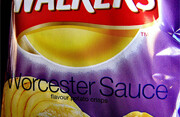Their logos and packaging are near clones—Lay's potato chips in the United States and Walkers crisps in the United Kingdom. The story behind the similarity is that both brands are owned by PepsiCo. But a subtle difference sets them apart. Each bag of Walkers crisps carries a label stating that 75.0 grams of carbon were emitted to produce a 34.5 gram bag of chips.
In 2007, Walkers became the first major food brand to display a carbon label on its packaging. The label was the result of collaboration between PepsiCo and Carbon Trust, a British-government-funded nonprofit that works with businesses and the public to transition to a low-carbon economy. Founded in 2001, Carbon Trust's mission is to help businesses worldwide become accountable for the lifecycle greenhouse gas emissions of their products and services—an idea that has only begun to penetrate corporate culture.
The assessment of total lifecycle emissions, known as "carbon footprinting," includes production, transportation, use, and disposal. Carbon Trust created the subsidiary Carbon Label Company in 2007 to help businesses communicate their carbon reductions through labels that state product lifecycle emissions in terms of an equivalent gram value of CO2.
By developing this "carbon reduction label," Carbon Trust has shaped the future marketing war over the environmental sustainability of consumer goods and services. We're entering an age when consumers at the grocery store will count not only calories but also carbon.
Carbon Trust has also elevated the importance of certification standards for corporations that are trying to be sustainable. In order to retain the right to use the Carbon Trust label, businesses that partner with Carbon Trust must commit to its measurement standards and to a two-year program of carbon reduction. Since 2000, Walkers has reduced its energy use per pack of chips by 33 percent, and its water use by 45 percent. They have also pledged to continue annual reductions of 3 percent and 5 percent respectively for energy and water.
Where Carbon Trust faces an uphill battle is the public perception that corporate sustainability initiatives are heavy on marketing and light on remediation. Corporations know that climate change is now part of consumer consciousness. If they refuse to reduce greenhouse gas emissions, they face a public relations liability. As a result, companies are racing to embrace the mantra of the "triple bottom line," where organizational success means balancing people, planet, and profit.
But shareholders rarely praise corporate social responsibility unless it's paired with strong profits and growth. Corporations and their boardrooms are still beholden to the golden rule of any public company: Increase shareholder equity. If a company's primary focus is profit, the temptation exists to distort claims of sustainability, resulting in a media landscape rife with "greenwashing" where advertisers sell the sustainability ethic without adequate scientific assessment or documentation. Many consumers may take claims of corporate environmental sustainability at face value, but there is also a growing movement to start crunching the numbers.
The challenge for Carbon Trust—the one inherent in its name—is gaining the public's trust as an authority on reliable monitoring and certification of corporate sustainability claims. To accomplish this, Carbon Trust needs a high level of institutional transparency for its standards and practices.
On October 23, 2008, Carbon Trust released its official standards for evaluating carbon sustainability. Known as the "Publicly Available Specification 2050" or PAS 2050, this online resource provides access to the carbon footprint reduction criteria and emissions standards that must be met by companies that receive Carbon Trust certification and labeling rights.
A joint project with the British Standards Institution (BSI) and the UK's Department of Environment, Food, and Rural Affairs (DEFRA), the PAS 2050 standard is based on a 100-year lifecycle assessment of greenhouse gas emissions for products. Extensive research was conducted on seventy-five product categories from more than twenty British companies such as Tesco and Boots. DEFRA also tested the PAS 2050 on up to 100 food products to assess their impact, from production through distribution.
To support PAS 2050, Carbon Trust has developed a "Code of Good Practices on GHG Emissions and Reductions Claims." The Code helps businesses to clearly communicate their lifecycle greenhouse gas emissions with certified data. This paired with the Carbon Trust's position as an independent nonprofit provides some of the credibility needed to gain the public's confidence, and with it the confidence of the business community.
Carbon Trust has defined with PAS 2050 what may become a benchmark in carbon lifecycle reduction assessment for business. But the big question remains: When will it cross the pond? Given that standards gain power as they proliferate through international networks, many are eagerly awaiting an answer from PepsiCo.
UPDATE: Based on a Carbon Trust assessment, PepsiCo plans to post the carbon footprint of its Tropicana brand orange juice on Tropicana's website. An equivalent of 3.75 pounds of CO2 are emitted for each half-gallon carton of orange juice, according to Carbon Trust, a 20 percent increase over previous internal PepsiCo carbon footprint assessments. In terms of carbon labeling, PepsiCo has yet to decide whether it will include Tropicana's carbon footprint on its packaging.




